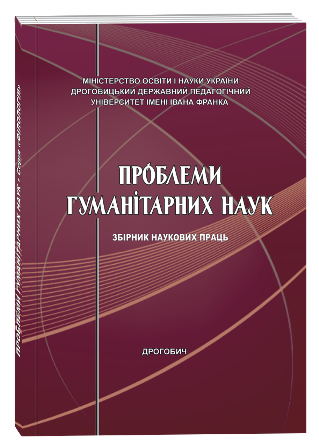КРИСТАЛІЗАЦІЯ КОНЦЕПТУ «НАЦІОНАЛЬНА ІДЕЯ» В ГАЛИЦЬКОМУ МІЖВОЄННОМУ ДИСКУРСІ
DOI:
https://doi.org/10.24919/2522-4565.2023.56.11Ключові слова:
український підпільний рух, національна ідея, міжвоєнний дискурс, концепт, термін-політонім.Анотація
Анотація. У науковій розвідці висвітлено суспільно-політичне буття Галичини міжвоєнної доби, загострено увагу на кристалізації національної ідеї – Української Самостійної Соборної Держави (УССД) – як ключового концепту в українській політичній картині світу 20-30-их років ХХ ст. Саме цей концепт-ідея став предметом дослідження, детермінувавши його мету – когнітивно-дискурсний аналіз концептуального поняття, його наповнення мілітарними смислами. Наголошено, що ідея Української Самостійної Соборної Держави дієво утверджувалася як у колах української військової еліти, так і на сторінках найавторитетнішого журналу міжвоєнної доби – «Літературно-наукового вісника». Під орудою головного редактора Дмитра Донцова журнал став знаковим інтелектуальним явищем у національно-культурному поступі. Вісник консолідував і мобілізував (ідеологічно, політично, психологічно) лави переконаних і відданих борців за державність України. Досліджено, що публікації в «Літературно-науковому віснику» стимулювали розвиток української політичної думки, розбудовуючи українську політичну терміносистему, кристалізували національну ідею, сприяли формуванню ментального «Я» українця, у якому мав домінувати націє- та державотворчий орієнтири. У контексті відновлення історичної пам’яті, знакових сторінок нашої історії осмислено витоки українського підпільного руху (Українська військова організація, Організація українських націоналістів), його місце та значення у становленні української державності. На основі когнітивного та комунікативно-прагматичного вимірів політичного терміна обґрунтовано, що кожен політонім-термін – ідеологенний, а кожен політонім-концепт – культурно значущий й ідеологічно зорієнтований. Адже політична культура нерозривно поєднана з ідеологією, яка моделює в політиці систему ідеалів та цінностей. Підкреслено, що якраз аксіологічний (ціннісний) компонент є визначальним у значеннєвій структурі концепту.
Посилання
Гунчак Т. Україна : перша половина ХХ століття. Нариси політичної історії. Київ : Либідь, 1993. 288 с.
Дашкевич Я. Дмитро Донцов і боротьба довкола його спадщини. Донцов Д. Твори. Т. 1. Львів : Кальварія, 2001. С. 7–19.
Донцов Д. Наші цілі. Донцов Д. Літературна есеїстика. Дрогобич : Відродження, 2010. С. 54–58.
Жайворонок В. Знаки української етнокультури : словник-довідник. Київ : Довіра, 2006. 703 с.
Кононенко В. Символи української мови. Івано-Франківськ : Плай, 1996. 269 с.
Кук В. Генерал-хорунжий Роман Шухевич. Головний командир УПА. Львів : ЦДВР, 2005. 120 с.
Лексикон львівський : поважно і на жарт / Хобзей Н., Сімович К., Ястремська Т., Дидик-Меуш Т. Вид. 2-ге, доповн. і виправл. Львів : Інститут українознавства імені І. Крип’якевича НАН України, 2012. 852 с.
Мартинець В. Українське підпілля. Від У.В.О. до О.У.Н. Спогади й матеріали до передісторії та історії українського організованого націоналізму. 1949. 349 с.
Перепічка Є. Історія ОУН і УПА. Т. 1. Львів : Сполом. 2012. 606 с.
Словник української мови: в 11 тт. / АН УРСР. Інститут мовознавства; за ред. І. К. Білодіда. Київ : Наукова думка, 1970–1980.
У.В.О. Видання Пропагандивного Відділу. 1929. 47 с.



